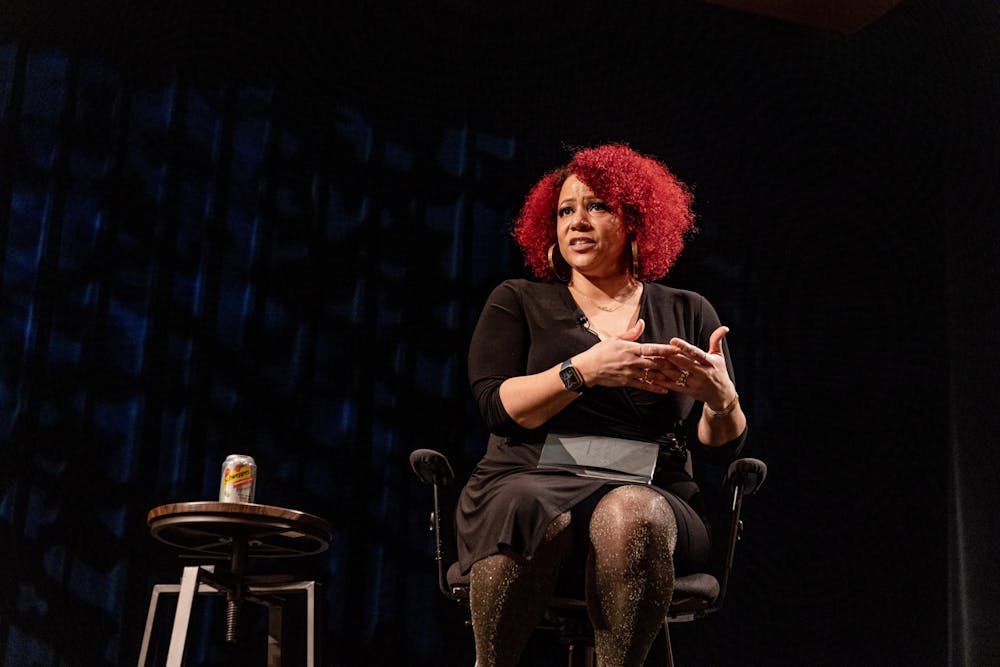By Lysa Legros
Staff Writer
Pulitzer Prize winning investigative journalist and author of “The 1619 Project.” Nikole Hannah-Jones joined Kim Pearson, a journalism and professional writing professor at the College, for a moderated discussion on March 3 at 6 p.m in Kendall Main Hall. The discussion was geared toward Hannah-Jones’ inspirations, influences and impact of “The 1619 Project.”
“My goal was to establish a common understanding of what Nikole Hannah-Jones does, what it means to be an investigative journalist, and how she applies that to the 1619 project and give her a chance to respond to criticism of it,” Pearson said. “I hope the interview gave enough insight into her work, her goals and her process so that people if they chose to read the work, have a context for it.”
During the discussion, Hannah-Jones discussed the significance of journalism — investigative journalism, especially.
“Investigative journalism is the highest calling of journalism,” Hannah-Jones said. “It’s journalism that seeks to hold power accountable, that unearths things horrible people don’t want to be known.”
During her presentation, Hannah-Jones discussed the experiences that inspired her to pursue a career in journalism. In 1988, when she was eleven years old, she wrote a letter to the editor of her local newspaper that was published in the paper, expressing her concern that Jesse Jackson was not doing well in her state’s (Iowa) primary because of racial prejudice.
“I understood the power of words and writing and journalism and what it meant to tell your own story,” she said. “I saw writing as a weapon that could unveil injustice in society.”
“The 1619 Project” was also influenced by her desire as a young child to see herself reflected in American history.
“I knew we were human and clearly had worth, but I believed that we must not be learning about black people because Black people must not have done much for us to learn about,”she said. “Because surely if we had, someone would teach us about it.”
When she was in tenth grade, her school offered a one-semester Black studies elective that taught her more about African American history than she had ever known before.
“In those three months, I learned more about the history and contributions of Black people in the United States than I ever learned in my entire life,” Hannah-Jones said. “And I understand why they’re trying to ban our history because I became incorrigible. I understood at 16 years old, the power of that erasure, the intentionality of that erasure, and also, the empowerment of knowing that there is information to be had and that I had to seek it out.”
She became passionate about sharing that history with others.
“I understood that the same way history helped me understand the world, that history would help people who read my journalism understand the world,” Hannah-Jones said. “In a country that is suffering from what I call ‘nationalized amnesia’ when it comes to the history of race and racial inequality, I couldn’t just write about why black people are still the most segregated group of Americans today if I don’t go back and show you how the architecture — the policies, the decisions — intentionally created segregation.”
Although Hannah-Jones had an educational background in history and African American history, she decided to pursue a career in journalism because it allowed her to engage with current societal issues.
At the end of the discussion, members of the audience were given opportunities to ask questions.
Isabella Lamboy, a sophomore engineering major, attended the event and asked a question about the merits of nonfiction and fiction.
“I was nervous. I kept thinking, ‘Don’t be the first! Don’t be the first!’ But it felt very good because, for a second, she was talking to me, she was taking my question seriously, and I appreciated that,” Lamboy said. “‘The 1619 Project’ is a combination of fiction and nonfiction. Though they are not the same, they have equal weight. Fiction gives people humanity — it allows you to relate to the heart of other people. We can’t know the truth about everything, but we can make good guesses.”
Some audience members left the event with a greater appreciation for history and the recognition that they, too, could change society.
“We don’t have to sit back and accept that this is the way things are because that’s how it's always been,” said Gabriella Pacheo, a senior psychology major. “Being able to understand all of that has happened before can help us. It can give us hope that we can change how things are right now and help people understand that systemic racism is a thing that exists and how we can go about changing it.”







